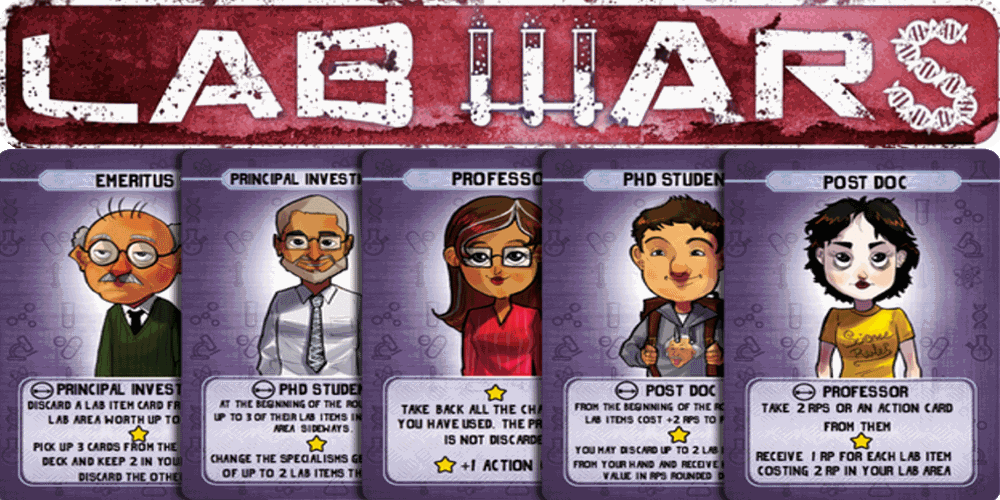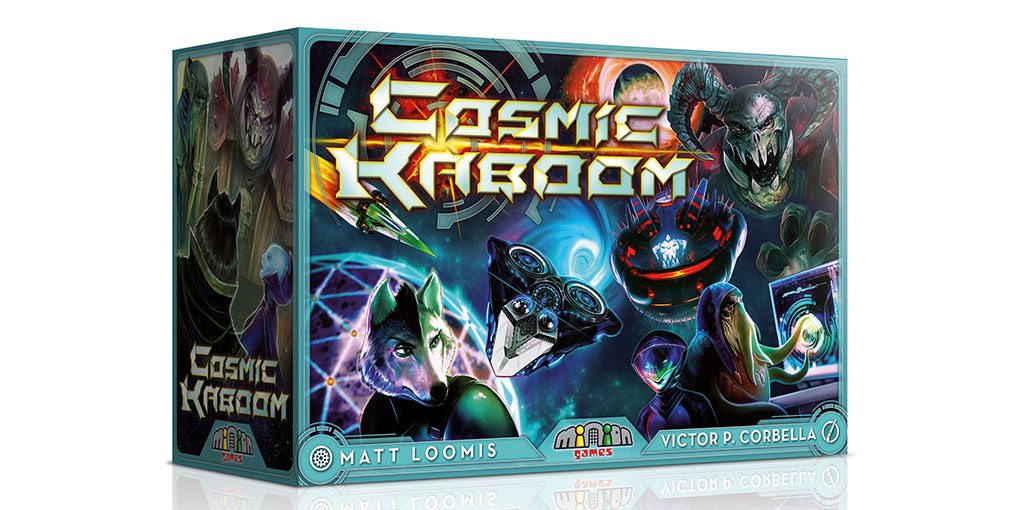
1,2,3,4! I declare a Lab War!
Academic research. The majesty of scientific endeavor. Pushing back the boundaries of human knowledge, and er…stabbing your rivals in the back. Welcome to Lab Wars.
At a glance: Lab Wars is a bluffing and strategy card game for 2-4 players. Its premise sees players trying to build their scientific reputations to greater heights than the competition. One way to do this is to science the heck out of stuff, the other is good old-fashioned sabotage.
In Lab Wars you have to use your team of scientists to build a research lab full of exciting equipment, then use that equipment to research papers, write a pop-science book, and if you’re lucky, win a Nobel Prize. At the same time, you have to protect yourself from your greedy and unscrupulous fellow scientists, who want to shaft you on every turn. With a neat rock, paper, scissors mechanic, you never quite know if you’re safe from the saboteur.
Lab Wars has just started its Kickstarter and is the first game by a group of UK-based designers, led by research scientist (a man with a Kevlar backplate), Caezar Al Jassar and his partner Dr Kuly Heer.
New to Kickstarter? Check out our crowdfunding primer.

Game Components:
- 25 Character cards.
- 72 Lab Item cards
- 15 Action cards
- 24 Impact cards
- 1 genius token
- 50 Research Points.
The Character cards are four sets of five, one for each player. The characters in the game are the PhD. student, the Post Doc., the Emeritus, the Principal Investigator, and the Professor.
Impact Cards are the measure of success. These are your Nobel Prizes and research papers. The cards have differing “Impact Points” totals and the player whose scientists make the biggest impact by the end of the game is the winner.
The Lab Item cards are what you carry your research out with. In the standard game, everybody starts out with some pipettes and a thermo-cycler.
Action cards are special actions you can carry out. You can gain the use of these cards if you successfully sabotage your opponents.
The genius token denotes the first player and moves on after each turn.
Research Points are collected when you use your lab equipment. You can then use them to purchase impact cards or more lab items with which to research.
How to Play:
Set up is straightforward. There’s a deck of Lab Items to pick up, and 3 piles (one for each type) of Impact cards to collect (the exact number of which varies, depending on the number of players involved). Action cards are also placed face down on the table. Each player receives the Lab Items “Pipettes” and “Thermal Cycler.”
 The game is roughly into two phases. For the first, everybody takes part simultaneously. In the second phase, each player takes turns, starting with the holder of the Genius Token.
The game is roughly into two phases. For the first, everybody takes part simultaneously. In the second phase, each player takes turns, starting with the holder of the Genius Token.
The first phase utilizes a rock, paper, scissors dynamic, which adds fun and irritation in equal measure. It doesn’t take long to build up a vendetta in this game. Each of the character cards has a useful power, such as the Post Doc, who brings you extra lab items. Each character card can also sabotage one of the other 4 characters. The Post Doc can sabotage the Professor. This means that if any of the other players have chosen The Professor, the Post Doc can steal some of that player’s stuff. They would also gain an influential Action Card, which can be used to great effect later in the game.
This part of the game is a challenging game of bluff, with genuine tension as you all flip over your card to reveal who you’ve played. I think this part works better the more players you have. It’s more than likely you’ll catch somebody out, but also that you’ll be caught too. In the two-player game, the one-on-one nature of the reveal makes it directly adversarial, especially if you’ve already been sabotaged. Once you have played a particular character, it cannot be played again until you have played your Professor, whose talent is bringing back all character cards into a player’s hand.
This mechanic is intriguing because there is forever a dilemma of wanting to play a particular character to utilize its ability, whilst also not wanting to be caught out and your careful plans sabotaged.
After the effects of playing character cards have been resolved, the players then start their individual turns, starting with the current holder of the Genius Token.
In conceptual terms, you use your Lab Items to do research, the results of which enable you to either expand your laboratory (buy more Lab Items) or make an impact in the scientific community (write a paper, publish a book) by buying Impact cards.
That in itself is simple, but the various Lab Items make each turn varied in and interesting (as does finding that somebody has filched your best piece of equipment in the sabotage turn). You start with Pipettes and a Thermal Cycler, but you can add Centrifuges, Mass Spectrometers, Genome Editing Tech, and even a Crazed Technician (who basically trashes your lab in exchange for a scientific discovery).
A layer of additional complexity is added because not all research you do is in the same specialism, and not all pieces of equipment provide the same type of research. So this means you have to mix and match or find ways to convert your research expertise. The path to the Nobel Prize is not straightforward!
Once you have exhausted your research capabilities, play passes on to the next person. Once all players have had their turn, you each get a new Lab Item and Two Research Points.
You then each choose another character card to play and see who is going to stitch up who. (Tactical Note: The Professor card brings all already played character cards back into your hand, but if you hold on to her until you have no other cards to play you’re asking to be sabotaged.)
Play continues until there are no Impact Cards left. At which point the Impact Points (and other contributing factors) are totaled up and a winner declared.
The Verdict:
I’d like to think that the world’s greatest scientific minds aren’t quite so ruthless in the pursuit of being the first to their discoveries, but it’s amusing to pretend they could be. If you don’t like conflict in your board games, then this definitely isn’t a game for you. The sabotaging and backstabbing can get quite heated, depending on who you have playing, of course. It is also a lot of fun (especially if you’re the stabber rather than the stabee).
I really liked the two-step process in the game. The first section gives the game a social feel, whilst phase two allows you to work on your own strategy without being too hindered by your opponents’ choices. (Unless they’ve chosen to steal your autoclave.) There are a number of decisions to make and options to balance as you decide what to do. There’s strategy without things ever becoming too bogged down.

The look of the cards is great. A lot of thought has been put into the design of the game and its components. For some reason, I find the logo and card backs particularly pleasing. Not on its own a reason to back the game, but it’s nice when the details feel right.
Lab Wars is a great way to pass an hour or so, particularly if you are a member of the scientific community. There aren’t too many games along this theme on the market, so this is a nice addition. An affordable one too. At $27 or £19, with free postage bringing you the entire game, it shouldn’t break the bank.
The Lab Wars Kickstarter blew through it’s funding target on the opening day, and is now well on the way to its third stretch goal. This is a neat, well thought-out game that is definitely worth a look.
Disclosure: I received a prototype version of the game for review purposes.



